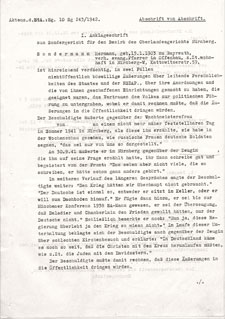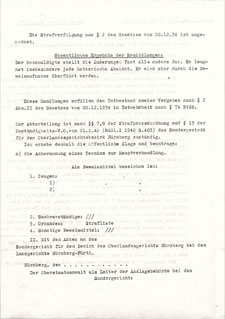Hermann Sondermann: Criticizing Nazi Church Policy
Incautious remarks about the Nazi regime had grave consequences for Pastor Hermann Sondermann (1903–1960). Sondermann was born on January 15, 1903, the son of a treasury official in Bayreuth. He attended high schools in Oettingen and Nuremberg and was a member of the Wandervogel movement. He started studying theology at the universities in Erlangen and Tübingen in 1923. In 1927, he started his vicarage and became a candidate at the theological seminary in Nuremberg. In 1931, he became a pastor in Offenbau where he especially devoted himself to youth work and organized child and youth camps for several weeks every year in collaboration with the Nuremberg Inner Mission.
Sondermann joined the SA in 1932. At first, he was enthusiastic about the Nazi seizure of power in January of 1933 but soon began having his first doubts and moved toward the Confessing Church. He was outraged at the murder of SA Chief of Staff Ernst Röhm (1887–1934) at Hitler’s command. From then on, he contemplated of resigning from the SA. In response to his criticism of Hitler’s armament policy at an SA training evening in 1935, the Gau speaker called him an “insubordinate cleric” and a “confessional bastard” who had no business in the “Third Reich”. He also had to answer to the Bavarian church government for his conduct, which the NSDAP had notified about the incidents.
In 1941, the Nuremberg area church government assigned Sondermann to Grossreuth near Schweinau and Gebersdorf. That summer, he made critical remarks to a lodger about the war and the Nazi regime’s church policy, observing: It’s going to get to the point that Christians will have to wear a cross on clothing just as the Jews are being forced to wear a star (A. Sondermann, Jahr, 18). As a result, he was denounced by the lodger and put on trial before a Special Court for violating the Treachery Act. The trial brought him one year in prison, which he served from May of 1942 to May of 1943. Since he had brought a banned book by Leo Tolstoy with him, he was put in prolonged solitary confinement where he contracted severe pneumonia.
Sondermann’s family, the mayor of Offenbau and the regional consistory petitioned to have his sentence reduced. The prison director made the granting of their petitions contingent on a declaration of political support of the Nazi state and Hitler. What is more, he threatened Sondermann with internment in a concentration camp after his prison term. This was common for political prisoners. Sondermann was unwilling to declare his support of the Nazi state and argued that, as a pastor, he only professed his faith in the triune God. He had realized in the meantime that the Bible verse “Man must be more obedient to God that humans” was more important than the verse “Let every person be subject to the governing authorities”. The petitions were denied.
At the same time, the Reich Ministry of Church Affairs and the Reich Ministry of Justice categorically demanded Sondermann’s dismissal from the regional church’s employ while he was serving his sentence. Since, church law required the dismissal of a pastor serving one year in prison, the Bavarian church government revoked Sondermann’s ordination and removed him from the clergy roster in 1943. Regional Bishop Hans Meiser (1881–1956), however, announced he would give him a job at church headquarters after his dismissal. The Gestapo was already waiting for him on the day of his release from prison in order to transfer him to a concentration camp but a high-ranking officer and close relative of Sondermann’s prevented this.
Sondermann returned to Offenbau and initially received a monthly subsistence allowance from the regional church until, after he had worked in Regensburg church tax office, the regional consistory reinstated him in his parish in Offenbau in August of 1944 by way of a pardon sanctioned by the political authorities. After World War II, he refused to testify against the woman who had denounced him out of consideration for her personal plight. He fully resumed his youth work in Offenbau. The regional consistory rescinded Sondermann’s transfer to Regnitzlosau because his experiences in prison made it impossible for him to bear the isolation there. Offenbau named him an honorary resident on the twenty-fifth anniversary of his service there. Hermann Sondermann died on June 7, 1960.
Source / title
- © Landeskirchliches Archiv Nürnberg, LKR 50560 Sondermann Hermann


